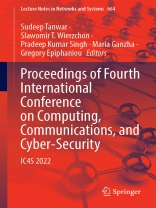This book features selected research papers presented at the Fourth International Conference on Computing, Communications, and Cyber-Security (IC4S 2022), organized in Ghaziabad India, during October 21–22, 2022. The conference was hosted at KEC Ghaziabad in collaboration with WSG Poland, SFU Russia, & CSRL India. It includes innovative work from researchers, leading innovators, and professionals in the area of communication and network technologies, advanced computing technologies, data analytics and intelligent learning, the latest electrical and electronics trends, and security and privacy issues.
About the author
Dr. Sudeep Tanwar is a professor in the Computer Engineering Department at the Institute of Technology of Nirma University, Ahmedabad, India. He received his Ph.D. in 2016 from the Faculty of Engineering and Technology, Mewar University, India, with a specialization in wireless sensor networks. His current interests include routing issues in WSN, integration of sensors in the cloud, computational aspects of smart grids, and blockchain technology. He has authored or co-authored more than 150+ technical research papers published in leading peer-reviewed international journals and international conferences from the IEEE, Elsevier, Springer, and John Wiley and has authored five books. He is a recipient of the Best Research Paper awards from IEEE GLOBECOM-2018 and Springer ICRIC-2019. He is a TPC member and reviewer of many international conferences across the globe. He is an associate editor of the Security and Privacy Journal and is a member of the IAENG, ISTE, and CSTA. He has Google Scholar citations 8405, H-index 52 and i-10 index 140.
Prof. Sławomir T. Wierzchoń received M.Sc. and Ph.D. degrees in Computer Science from Technical University of Warsaw, Poland. He holds Habilitation (DSc) in Uncertainty Management from Polish Academy of Sciences. In 2003, he received the title of Professor from the President of Poland. Currently, he is a full professor at the Institute of Computer Science of Polish Academy of Sciences. His research interests include computational intelligence, uncertainty management, information retrieval, machine learning, and data mining. He is an author/co-author of over 100 peer-reviewed papers in international journals and international conferences. He published, as author/co-author, 11 monographs from the field of Machine Learning. In the period 2000-2013, he co-organized 13 international conferences on intelligent information systems. Co-authored proceedings from these conferences were published by Springer. He co-edited two volumes of proceedings of the international conference on Computer Information Systems and Industrial Management, and he has served as a guest co-editor of three special issues of Information and Control journal. Currently, he is a member of the editorial board for some international journals, as well as member of many program committees for international conferences. He cooperated with medical centers in the area of statistical data analysis and knowledge discovery in databases. For more information, visit his homepage.
Dr. Pradeep Kumar Singh is currently working as a professor and head in the Department of Computer Science at KIET Group of Institutions, Ghaziabad, India. He is an associate editor of the IJISMD, [IJISMD is indexed by Scopus and Web of Science], IJAEC, IGI Global USA, SPY, Wiley, and IJISC from Romania. He is recently appointed as a section editor, Discover Io T, Springer Journal. He has published nearly150 research papers. He has received three sponsored research project grant worth Rs 25 Lakhs. He has edited a total of 16 books from Springer and Elsevier and also edited several special issues for SCI and SCIE Journals from Elsevier and IGI Global. He has Google Scholar citations 1850, H-index 22 and i-10 index 50.
Dr. Maria Ganzha is an associate professor in the Faculty of Mathematics and Information Science. She has an M.S. degree and a Ph.D. degree in Mathematics from the Moscow State University, Russia, and a Doctor of Science degree (in Computer Science) from the Polish Academy of Sciences. Maria has published more than 200 research papers, is on editorial boards of 6 journals and a book series, and was invited to program committees of more than 150 conferences. She is also the principal investigator, of the SRIPAS team, in the INTER-Io T project. Here, her team is responsible for use of semantic technologies in the context of interoperability of Io T platforms. She has 1594 Google citations, H-index 19 and i-10 index 58 in her account. Her area of interest includes computational intelligence, distributed systems, agent-based computing, and semantic data processing.
Dr. Gregory Epiphaniou currently holds a position as an associate professor of security engineering at the University of Warwick. His role involves bid support, applied research, and publications. Part of his current research activities is formalized around a research group in wireless communications with the main focus on crypto-key generation, exploiting the time-domain physical attributes of V-V channels. He led and contributed to several research projects funded by EPSRC, IUK, and local authorities totaling over £8M. He is also the main inventor of a patented-pending technology on a distributed ledger system (GB2576160A/US200042497A1). He was previously holding a position as a reader in Cybersecurity and acted as deputy director of the Wolverhampton Cybersecurity Research Institute (WCRI). He has taught in many universities both nationally and internationally in a variety of areas related to proactive network defense with over 120 international publications in journals and conference proceedings and author in several books and chapters. He holds several industry certifications in Information Security and worked with several government agencies, including the UK Mo D, in cybersecurity-related projects. He currently holds a subject matter expert panel position at the Chartered Institute for Securities and Investments. He acts as a technical committee member for several scientific conferences in information and network security. He serves as a key member in the development of WS5 for the formation of the UK Cybersecurity Council.












